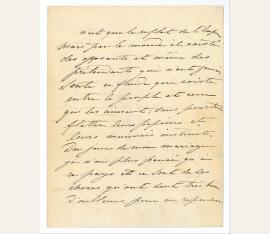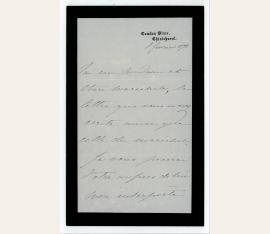Empress of the French (1826-1920). Autograph letter signed. Compiègne. 4to. 7½ pp. on bifolia. In French.
$ 3,740 / 3.500 €
(91595/BN60916)
Important letter to the lawyer, magistrate, and later police chief of Paris, Joseph Marie Piétri, in which she states her political convictions. Apparently, Piétri had challenged Eugénie to position herself politically, pointing to the possibility of a regency for her then five-year-old son Prince Louis-Napoléon. Although she declares herself to be "generally removed from politics, as much by taste as by calculation", the current debates of "many contrary ideas" did not go unnoticed. It seems that Piétri, who would earn a reputation as a repressive chief of police, expressed his concerns about liberal tendencies.
Eugénie, who is known for her conservative and neoabsolutist politics, remains somewhat vague and prefers to speak of the Emperor, who "has too much righteousness in his heart and too much knowledge of his worth to lean either to the right or to the left". She refuses to comment on a quote by Emperor Napoleon I, even if she is aware "of many others that might cancel it out", and declares her determination "not to go into the substance" of Piétri's original letter. Concerning the core issue of a potential regency, she does make a clear statement: "You fear for the future if, for the misfortune of all of us, a regency, even temporary, were to be necessary; the state of mind worries you. For me, it reassures me because in spite of the noise that one wanted to make around my name, in spite of the opposition to liberal ideas that I would be obliged to make; to what you tell me, I never received a more sympathetic reception of the population than this year. I know that it is only the reflection of the Emperor, but all over the world there are opponents and even pretenders who have never felt this fluidity that exists between the people and those who love them; without however flattering their passions and their bad instincts. From the day of my marriage I have thought only of this country". She even goes on to scold Piétri for questioning her convictions and issues a warning concerning his own integrity: "Besides, to reproach me for my opinions, would it be necessary to know them? In which forum did I make my voice heard? Which newspaper is animated by my thoughts? The freedom that is granted to all, that of thought, with what right do they want to take it from me? Believe me, let your devotion not be so quickly alarmed and fear rather that traditions, sympathies perhaps too foreign, will prevent you from judging things and especially men". - In closing, Eugénie mentions her son and what she wants to pass on to him: "My son will be brought up with the idea that there is no sacrifice that should cost him [too much] for the happiness of his country, and that in the profession of sovereign he will find more thorns than roses and I hope that he will adopt his grandfather's motto 'do what you must, come what may'; esteem of honest people, fortune will do the rest and all my wishes will be fulfilled". - Joseph Marie Piétri (1820-1902) was a Corsican Bonapartist who served as prefect of various departments between 1853 and 1866, when he was appointed chief of the Parisian Police, a post previously held by his brother Pierre Marie, who had resigned following the attempt on Napoleon's life in 1858. On 4 September 1870, Joseph Marie Piétri hastily left France and followed Napoleon III into exile. From 1879 until 1885 he served as senator for Corsica. - On stationery with blindstamped crowned monogram..
Empress of the French (1826-1920). Autograph letter signed. Camden Place, Chistlehurst. 8vo. 6 pp. on bifolia.
$ 2,672 / 2.500 €
(91598/BN60919)
Beautiful letter to the wife of a Marshal of France, possibly Pepita de la Peña y Azcarate, the Mexican wife of François Achille Bazaine, to thank her and her husband for condolences following the death of Napoleon III on 9 January 1873: "J'ai reçu, Madame et chère Maréchale, la lettre que vous m'avez écrite ainsi que celle du Maréchal. Je vous prierai d'être auprès de lui mon interprète dans cette triste circonstance. La douleur qu'il a plu à Dieu de nous envoyer serait au-dessus de nos forces, s'il ne nous regardait avec miséricorde et ne nous accordait la résignation si difficile à atteindre ! - Ma seule consolation est de voir dans les regrets immenses inspirés par la mort de l'Empereur un juste hommage à la mémoire de celui à qui aucune douleur morale et physique n'a été épargné ! Mon fils et moi n'oublierons jamais les jours qui viennent de s'écouler.
Le vide immense qui s'est fait dans notre maison ne peut être comblé ; il ne nous reste plus qu'à prier et à nous incliner devant les décrets de sa providence. Croyez Madame la Maréchale [...]". Three of the Marshals of France appointed by Napoleon III until 1870 were still alive in 1873. Of the three, François Achille Bazaine (1811-88), who served as commander-in-chief following the arrest of the Emperor, was most loyal to the Imperial family and had remained in contact with Empress Eugénie following her escape from Paris in 1870, apparently in an attempt to overthrow the Government of National Defence and restore the second Empire. In consequence, Bazaine was tried for treason and sentenced to military degradation, an enormous fine, and twenty years' imprisonment. On 10 August 1874 Bazaine escaped from the Fort Royal, the only prisoner ever to do so, and fled to London. - Alternately, Bazaine's rival Edmond Le Bœuf, who had served as the Emperor's aid- de-camp from 1866, could be the Marshal of France in question. - On mourning paper with embossed letterhead..

